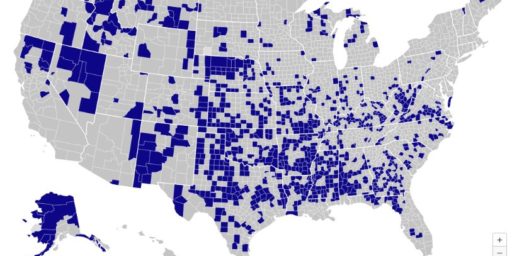Philadelphia Considers Wireless Internet for All
Philly Considers Wireless Internet for All (AP)
For about $10 million, city officials believe they can turn all 135 square miles of Philadelphia into the world’s largest wireless Internet hot spot. The ambitious plan, now in the works, would involve placing hundreds, or maybe thousands of small transmitters around the city — probably atop lampposts. Each would be capable of communicating with the wireless networking cards that now come standard with many computers. Once complete, the network would deliver broadband Internet almost anywhere radio waves can travel — including poor neighborhoods where high-speed Internet access is now rare.
And the city would likely offer the service either for free, or at costs far lower than the $35 to $60 a month charged by commercial providers, said the city’s chief information officer, Dianah Neff. “If you’re out on your front porch with a laptop, you could dial in, register at no charge, and be able to access a high speed connection,” Neff said. “It’s a technology whose time is here.”If the plan becomes a reality, Philadelphia could leap to the forefront of a growing number of cities that have contemplated offering wireless Internet service to residents, workers and guests. Chaska, Minn., a suburb of Minneapolis, began offering citywide wireless Internet access this year for $16 a month. The signal covers about 13 square miles. Corpus Christi, Texas, has been experimenting with a system covering 20 square miles that would be used (for now) only by government employees. Over the past year, Cleveland has added some 4,000 wireless transmitters in its University Circle, Midtown and lakefront districts. The service is free, and available to anyone who passes through the areas. Some 1,016 people were logged in to the system at 2:20 Tuesday afternoon, said Lev Gonick, chief information officer at Case Western Reserve University, which is spearheading the project and paying for a chunk of it. “We like to say it should be like the air you breathe — free and available everywhere,” Gonick said. “We look at this like PBS or NPR. It should be a public resource.”
Interesting. While my general instinct on these matters is to have government intervene only when the private sector can’t provide a service, this doesn’t strike me as an inherently bad idea. Broadband access, especially a wireless variety, could certainly be considered a key part of the public infrastructure today. My main concern is practical rather than theoretical: Would this stifle innovation? Under the competitive market, communications technology has improved by leaps and bounds as companies strive to lure customers with better or cheaper service. Would that still be the case under a government model?





But then again, it, like ever’thin’ else, may come under the control of Walmart, anyway, which will effectively stifle any competitive market. In speculatin’ the future, the field is always wide open. 😉
Ubiquitous “high-speed” wireless is clearly going to be expensive to deploy, witness the bankruptcy of Ricochet and the failure of cellular companies to really deploy “3G”. I suspect any large free zones are either going to be unreliable or very slow once large numbers of users start trying to use it.
A small company I do some work with just signed a contract to put in a wireless backbone that will tie together every water treatment plant in Northwest Arkansas (some EPA thing). The end result will be that about 1/8th of the state will be a giant wireless hotspot in the next eighteen months or so. It started as a government thing, but has already grown with companies like Tyson wanting to tap into it and share some of the costs. A lot of grand visions fail simply because they are too grand. Bit-size chunks seem to be more workable.
I’m moving to Philly. Porn, faster, cheaper. Brilliant.
I’m moving to Philly. Porn, faster, cheaper. Brilliant.
If Philly offered free city-wide wireless, no one else could compete. They would be the only game in town. And, they’d probably start nibbling at the edges of freedom and work inward. Sure, soft-core porn might not be a problem, but what if Rusty starts downloading the stuff that’s legal but a bit harder?
What if Rusty peruses a bunch of .cn web sites?
Your ISP and google is bad enough, I don’t want the government keeping track of my web habits. And, given past instances, that’s probably what would end up happening.
Note also that, AFAIK, wireless cards send their MAC address, and that’s a universal identifier. It might not tie into a specific person, but that might be able to be determined by going from the manufacturer, back to the retail store, back to your credit card. In any case, the MAC address would allow them to track all traffic from and to that same address.
This sounds like a nice idea, but making it work reliably and providing enough bandwidth are going to be serious challenges. The wider the area covered the more people will sign up–and we don’t have nearly enough experience with providing WiFi coverage to thousands of simultaneous users in any given area. There are also some huge security concerns, given the insecurity of WiFi encryption and the relative difficulty of setting up something like IPSEC.
I do think projects like this can benefit from government sponsorship, as it’s too expensive for a startup to try and fit zillions of repeaters on top of lightpoles. Ricochet is sort of an example of this problem, but perhaps not the best one. (They were a bit ahead of their time, tried to grow the business far too quickly, and their focus was totally on the wrong group of users. If they’d concentrated on the SFBay area they would’ve done alright.)
The downside of having the government involved is the inevitable censorship issues. “No pr0n! No bomb plans! No [blah blah]! No file swapping!” Etc.
I beliee GPRS/GSM will win out over WiFi in the long term, at least for this sort of network. (Obviously at home and in businesses people will continue to use something like WiFi.) The cell providers already have experience with accomodating many simultaneous users, and their billing model allows them to handle relatively limited amounts of bandwidth. Cellular has far better range and coverage and has the bonus that it serves both data and voice with reasonable latencies. WiFi was never intended for handling these sorts of problems.